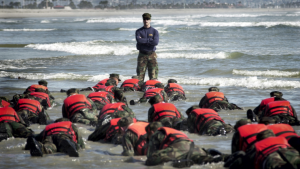Sometimes you just want to quit. You know you shouldn’t but nothing seems better than crawling back into bed and hiding under the covers. That is me in so many areas of trusting God.
I ran across an article talking about the emerging science of grit and resilience and how its teaching us a lot about why some people redouble their efforts when the rest of us are heading for the door. Their research was great, but it’s always nice to talk to someone who’s been there firsthand, and to see how theory holds up against reality. So who knows about grit and persistence? Navy SEALs.
So they interviewed James Waters, a SEAL Platoon Commander. His SEAL class had 264 participants and a 94% attrition rate. Out of 256 guys only 16 graduated — and James was one of them.
After reading the article found HERE I took these 3 major takeaways from it for my personal walk with God.
1. Purpose and Meaning
To say SEAL training is hard is a massive understatement. The initial vetting phase (“BUD/S”) is specifically designed to weed people out who aren’t serious.
How do you get serious? Grit often comes from a place of deep purpose and personal meaning. Here’s James:
At BUD/S you have to know what you’re getting yourself into and what you’re there to do. I still mentor a lot of guys who are interested in trying out for BUD/S and they always ask, “What do I need to do to make my pushups better?” or “Can you teach me the proper swim technique?” My first question is always, “Why do you want to be a SEAL? What is it about being a SEAL that appeals to you?”
And the research backs James up. Without a good reason to keep pushing, we’ll quit. Studies of “central governor theory” show our brains always give in long before our body does.
“…Overall, it seems that exercise performance is ultimately limited by perception of effort rather than cardiorespiratory and musculoenergetic factors.”
But this isn’t just true for athletics, it also holds for careers. In a study of West Point alums, those that had intrinsic goals (“I want to serve my country. I want to test my abilities.”) outperformed those that had extrinsic goals (“I want to rise in the ranks and become an officer because that’s a really powerful position and it’s prestigious.”)
So purpose matters and as I read that it hit me how often I forget my purpose from God. What He has called me to do. When I am focused on my calling, walking in confidence of who I have been made to be and operating in my God given talents…nothing can stop me! So remember WHO YOU ARE! Remember your purpose!
2. Prepare, Prepare, Prepare!
Marathons aren’t as hard after a few months of training. But if I said you had to run one tomorrow you’d probably cry.
Most people think SEALs are going from mission to mission, always in the field. Nothing could be further from the truth. James spent only 25% of his time deployed. He spent 75% of his time training. Why?
Skills are perishable and SEALs need to be so good at so much. Here’s James:
Most people assume if you’re a SEAL, you’ve been deployed in the combat zone every waking moment of the time you’re on active duty which, of course, isn’t the case. We spend 75% of our time preparing for deployment and about 25% on the deployment. The reason for that is we have a lot of skills to cover and a SEAL’s trying to be a “jack of all trades, master of none.” There are many different disciplines to master, all of which require a lot of upkeep. It’s not like you jump out of a plane once and then you remember how to do it forever. It’s something you’ve got to constantly revisit. When you hang out in the mountains of Afghanistan, you don’t exactly get to work on your scuba diving.
According to the research, who survives catastrophic scenarios? The people who have prepared.
According to Johnson and Leach, the sort of people who survive are the sort of people who prepare for the worst and practice ahead of time. They’ve done the research, or built the shelter, or run the drills. They look for the exits and imagine what they will do. They were in a fire as a child or survived a typhoon. These people don’t deliberate during calamity because they’ve already done the deliberation the other people around them are just now going through.
Research shows that reducing uncertainty reduces fear. According to Dan Coyle, before the Bin Laden mission SEALs built two full scale replicas of the building they’d be entering and practiced the raid for three weeks.
Preparing for the Christian walk comes from one place. The Bible. How often have I spent time in the book with the answers that I need to the problems I face everyday? Not as much as I should. I catch a podcast here and there, I go to church, Im a “good Christian” -BUT- in all honesty I haven’t exactly been preparing, preparing, preparing like I should to be the best I can be, in the face of my personal storm.
3. Find a Way to Laugh
Army Ranger Joe Asher said this about making it through the punishment of Ranger School: “If I can laugh once a day, every day I’m in Ranger School, I’ll make it through.”
James said the same thing about SEAL training:
You’ve got to have fun and be able to laugh; laugh at yourself and laugh at what you’re doing. My best friend and I laughed our way through BUD/S. We still tell the same jokes whenever I talk him. It’s one of my best memories of going through BUD/S. There’s something about when you’re facing a really crummy situation, to look over at your friend and see him smile. It tells you, “Alright, I’m going to be fine. We’re going to be fine and it’s all going to work out.”
Experts say that humor provides a powerful buffer against stress and fear.
We are way to hard on ourselves. Instead of beating ourselves up every time we fail and walking in defeat, remember God’s love and grace and mercy and GET BACK UP! Give yourself the same grace God extends to you, learn from the mistake and move forward. Let go of the hurt, the shame, the “whatever you think is separating you from God” and know that you’re going to be fine.
Those were my three big takeaways from the article and I hope they help you push through the tough times or to at least get back up the next time you fall.
-Carlos





